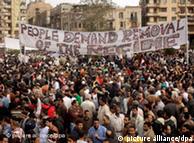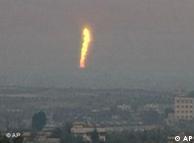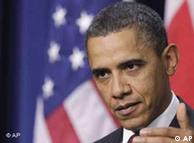MIDDLE EAST | 05.02.2011
Mubarak clings to power amid international calls for transition
The 12th consecutive day of protests in Egypt began with reports of automatic gunfire in the city of Cairo as protesters remained in Tahrir Square in defiance of the city's curfew.
On the Sinai Peninsula, Egyptian state TV reported an explosion and massive fire at a gas pipeline with branches that run from Egypt to Israel and Jordan. The state has attributed the blast to "terrorists," but said there was little damage to the pipeline.
However, as a result of the blast, gas supply to Jordan has been interrupted.
"As a result of the explosion, the National Electricity Co (NEC) has been obliged to replace Egyptian gas with heavy fuel for the generation of power," NEC Director General Ghaleb Maabreh said in a statement.
Jordan usually relies on Egypt's supply of gas for 80 percent of its requirements for running power plants, according to German press agency dpa.
"We still don't have details of how it happened," Gaber al-Araby, a local official, told Egyptian television, adding that rescue services were putting out the fire.
Egypt supplies about 40 percent of Israel's natural gas, and in December, four Israeli firms signed 20-year contracts worth up to $10 billion (7.4 billion euros) to import Egyptian gas.
At the epicenter of the protests in Cairo, Tahrir Square, the situation remained relatively calm early Saturday. Protesters said they would not leave the square at the heart of the city until their demands for change are met.
Increasing pressure on Mubarak
Friday had been marked by massive crowds of protesters in Tahrir Square, for what had been called the "Day of Departure," but Egyptian President Hosni Mubarak remained in power on Saturday despite growing international appeals for him to step down.
US President Barack Obama, while not explicitly saying the Egyptian leader should leave, said, "There needs to be a transition process that begins now," adding that the "patriot" should "listen to what is being voiced by the Egyptian people."
"We continue to be crystal clear that we oppose violence as a response to this crisis," he said, as Egyptian authorities called for protesters thronging central Cairo to go home but also vowed not to use force.
In Brussels, leaders of the 27-nation European Union also weighed in.
In a statement they said that the "transition process must start now" and condemned the recent violence, hinting that if the government cracked down on the protesters that there could be a suspension in aid.
Mubarak, who has been in office for 30 years, has admitted that he fears chaos if he were to step down immediately and used a perceived threat from Islamist militancy to solidify his position.
Vice President Omar Suleiman was due to meet a group of prominent figures on Saturday to examine a proposed solution under which he would assume the president's powers for an interim period, one of the group's members said, according to Reuters.
Mubarak held his first meeting with government ministers on Saturday after sacking the previous government last week. He met with ministers responsible for the main economic portfolios in his new government, the state news agency reported, adding that the prime minister, the finance minister, the oil minister and the trade, industry minister and central bank governor were in attendance.
Author: Stuart Tiffen (Reuters, AFP)
Editor: Sean Sinico
dw




No comments:
Post a Comment